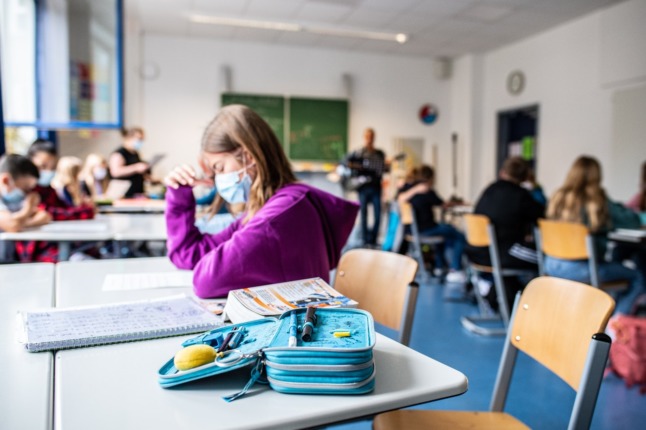The start of the school year is a stressful time for parents and a nervous time for children.
On the first day of school in a normal German school year, children starting the first year of Grundschule will head off carrying a Schultüte, while older siblings will be hoping that they haven’t forgotten too much over the holidays.
This year though there will be an added level of stress, as all of the German states have put further restrictions in place in the classroom which are aimed at slowing the spread of the coronavirus.
School starts in Saarland, Rhineland-Palatinate, Lower Saxony, Bremen, Saxony-Anhalt and Bremen this week.
All the German states want to avoid going into distance learning, as was the case for much of the last school year.
So what rules do parents need to be aware of?
Hesse
School starts in the central German state this Monday, where some 760,000 children will initially be required to observe stricter testing and mask wearing rules than those seen in the summer term.
For two ‘prevention weeks’, during which state authorities fear that children arriving back from summer holidays will pass on the virus, pupils will have to wear medical masks in the classroom and at organized events. They will also have to take antigen tests three times a week.
In the third week the mask wearing rules will be relaxed and pupils will only be required to take two tests per week.
The quarantine rules in the state have been narrowed down to pupils sitting directly next to the infected child and to immediate contact persons.
READ ALSO: How Covid vaccination rules for children differ around Europe
The south-west
In small Saarland, all children and teachers in Saarland will be required to wear medical masks at all times inside the school building and to take two antigen tests per week. The rules will initially apply for the first two weeks of the autumn term.
In Rhineland-Palatinate, too, two tests per week are planned for all children and teachers.
Fully vaccinated and recovered people are to be exempt from the rules in both states.
Lower Saxony
In Lower Saxony, where school starts again on Thursday, daily testing is mandatory for the first seven days of school – that is, until September 10th – according to the local ministry of education.
Pupils and staff will have to ‘test themselves free’ every day before they can go to school. Those who have been vaccinated or who have recoevered from an infection will not have to take the tests.
In the event that a pupil tests positive, all the children in their class will have to go into quarantine. Those who take a test after the case occurs and have a negative result will be allowed to attend class again.
Pupils who are fully vaccinated or recovered are not subject to the admission restriction.
Starting on September 13th, only three tests per week will be mandatory.
SEE ALSO: Why Germany is embroiled in a row over vaccinating children against Covid
Saxony-Anhalt
In Saxony-Anhalt, where classes also begin again on Thursday, all pupils and school staff must undergo an antigen test on the first day of school, according to the Ministry of Education.
In the two weeks that follow, tests will be given three times a week. After that, there will be a return to the previous system of two tests a week. Fully vaccinated and recovered pupils are exempt.
Bremen
Children in Bremen will start the new school year on Thursday by taking daily tests. Vaccinated and recovered children are exempt from the testing requirement.
From September 6th, all secondary school pupils will test themselves twice a week with a self-test kit.
Elementary school children will receive lollipop PCR tests for three weeks from that date. There is no compulsory mask-wearing for classes in Bremen.
If there is a positive case in a class, the entire group must be quarantined – except for those who have recovered and those who have been vaccinated. The quarantine can be ended with a negative test after ten days at the earliest.
What’s going on in states where school has already begun?
In Berlin, where school began in the second week of August, the city still has a ‘traffic light’ system that could end in children being sent into distance learning if the level is risk is assessed as ‘red’.
The situation at each school will be assessed by the local health office every Thursday. When the risk is green, the rules on indoor mask-wearing and three tests per week will apply. With yellow, however, class sizes will be halved, and with red, schools will be closed.
READ ALSO: Which German states are restarting school in August – and what will the rules be?
Hamburg’s school senator Ties Rabe (SPD) has called for the federal government to shorten quarantine rules for schoolchildren.
“It is incomprehensible that children, who recover faster, still have to remain in quarantine for 14 days and also have no opportunity to test themselves for free,” Rabe told Welt am Sonntag newspaper.
What about the states still on holiday?
Baden-Württemberg, where school does not restart until mid-September, plans to avoid whole-class quarantines. Instead, in the case of a child testing positive, all children in their class must test themselves daily for five days.
Since teachers are also contacts, this applies to them as well. However, vaccinated and recovered pupils and teachers are exempt from the testing requirement.
Full attendance is also the goal in Bavaria for the new school year.
The southern state, where the new terms starts in the middle of the month, is yet to publish a detailed plan. But the state cabinet are meeting for discussions on the topic this Tuesday, with mask wearing in the classroom expected to be agreed upon as mandatory.
READ MORE: Masks, Covid jabs, tests and ventilation: How German children are returning to the classroom



 Please whitelist us to continue reading.
Please whitelist us to continue reading.
Member comments